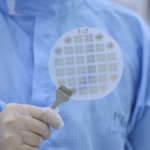A team of Chinese scientists has made a significant breakthrough in seawater desalination technology by developing a new polyester thin film that enhances water purification processes. The findings were published in the international journal Science on Friday.
Led by Professor Zhang Xuan from the Nanjing University of Science and Technology, the research team created a polyester reverse osmosis membrane that overcomes several limitations of mainstream commercial polyamide membranes. This innovation provides a promising solution for the next generation of seawater desalination technology.
Traditional reverse osmosis membranes, while effective in water permeability and salt rejection, are susceptible to degradation when exposed to chlorine and other strong oxidants commonly used in water treatment. “Seawater needs to be chlorinated in the pre-treatment process for desalination,” explained Professor Zhang. “However, chlorine-containing substances can damage the chemical structure of the polyamide film and even degrade it entirely. As a result, seawater must be dechlorinated after chlorination before it can enter the reverse osmosis filtration process.”
The newly developed polyester membrane exhibits impressive resistance to hydrolytic degradation and complete resistance to chlorine. This advancement could significantly reduce the pre-treatment steps required in desalination, streamlining the process and lowering costs.
This breakthrough holds considerable potential for addressing global water scarcity by making seawater desalination more efficient and sustainable. As freshwater resources become increasingly strained, innovations like this are crucial for securing clean water supplies for the future.
Reference(s):
Chinese scientists develop new material for seawater desalination
cgtn.com








